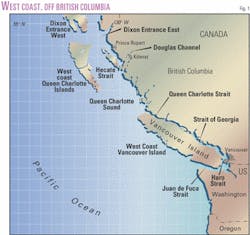Canadian Offshore: BC investigates lifting West Coast exploration ban
The British Columbia government is fast-tracking a controversial decision on whether to open for exploration the potentially prolific Queen Charlotte basin off Canada's West Coast.
The Geological Survey of Canada, in a 1998 report, estimated the undiscovered resource potential of the basin at 25.8 tcf of natural gas and 9.8 billion bbl of crude oil. The basin is located in the Hecate Strait between the Queen Charlotte Islands and the British Columbia mainland.
The area is subject to both British Columbia and federal moratoria on industry activity, and any approval for renewed activity would also require Ottawa's approval. Energy Minister Rich ard Neufeld said there would be no discussions with Ottawa until British Columbia completes its decision-making process.
The Canadian Association of Petroleum Producers, which represents a majority of large Canadian exploration and production companies, says it is anxious to access offshore oil and gas but will not become involved in the issue until moratoria are lifted. CAPP Pres. Pierre Alvarez noted the industry employed 35,000 workers in British Columbia in 2000 and generated $1.7 billion (Can.) in government revenues, which could be much higher with increased activity.
In the latest move in a long-running controversy over development, the new Liberal government in British Columbia, elected in 2001, appointed a three-member scientific panel in late October to examine technical and scientific issues related to offshore exploration. The panel was to report back to Neufeld by Jan. 15 on whether oil and gas can be extracted in a way that is scientifically sound and environmentally responsible.
The government also hired consultants to update an earlier offshore feasibility study, completed by the previous government, to bring it up to 2001 standards. And a government-appointed task force of six legislators was assigned to tour communities along the British Columbia north coast to gather public input on possible development. It also was to report in mid-January. The energy minister will then take a recommendation to the British Columbia cabinet for a decision.
Neufeld says the government committed during an election campaign to examine the issue, but wouldn't look at lifting the moratorium unless exploration and development can be done in a scientifically sound and environmentally safe manner.
"I have no idea what is going to come out of the reports. The scientists could tell us a whole host of things. They may tell us we should do this and that and it could take a year," Neufeld says.
The minister said any decision on development would also involve discussions with aboriginal people in the area on what their involvement can be. He said some aboriginals he has talked to want to get involved in economic development if it happens, but others are hesitant about it.
The federal ban on industry activity dates to 1972 when Ottawa imposed a moratorium on crude oil tankers traveling through Dixon Entrance, Hecate Strait, and Queen Charlotte Sound en route from Valdez, Alaska.
A subsequent federal cabinet order indefinitely prohibits drilling in these waters.
British Columbia added its own indefinite moratorium in 1982 prohibiting offshore exploration in the region, including Johnstone Strait and the Straits of Georgia and Juan de Fuca which lie between the offshore islands and the Canada-US mainland.
Last July, the new British Columbia government rejected a report on public consultation on offshore drilling prepared by Northern Development Commissioner John Backhouse, which was ordered by the previous New Democratic government.
The Backhouse report recommended a series of public meetings to gauge public opinion on the moratorium issue.
Neufeld rejected most of the Backhouse report and said British Columbia did not have time for an additional 18 months of public consultation as recommended in the report. He said his government would "take the oil and gas issue forward in an expedited fashion."
Public opinion in British Columbia is strongly divided on the issue in a region of Canada where resource exploitation and the environment often are flash points for public debate and controversy.
Those supporting removal of the ban say offshore exploration and development would provide a major boost for jobs and the economy in an area where there has been a serious decline in the traditional industries of fishing, forestry, and mining.
The North Coast Oil and Gas Task Force, a prodevelopment group allied with the British Columbia Chamber of Commerce, notes that the potential resources in the Queen Charlotte basin is almost 10 times the resources at the Hibernia development offshore Newfoundland that has sparked economic activity and job creation on Canada's East Coast.
David McGuigan, a Task Force spokesman, says offshore development would be a new economic generator for a region that desperately needs jobs and would offer huge revenue potential for provincial and federal royalties.
The British Columbia Chamber has formally requested the British Columbia and federal governments to reassess the inland marine zone to allow for offshore oil and gas exploration in the Queen Charlotte basin by lifting the moratoria.
Environmentalists argue that drilling in the earthquake-prone region would threaten a biologically rich marine environment.
Lynn Hunter of the David Suzuki Foundation, a leading environmental lobby, says the government appears to be willing to risk the environment in the hope of gaining windfall profits. Hunter said the risk of oil spills, chronic oil leakage, economic uncertainties, and the potential destruction of a beautiful area, outweigh any potential benefits.
Prior to the moratoria, Shell Canada Ltd. performed some initial offshore work during 1965-69, but there has been no industry activity offshore since 1971 when Chevron Canada Ltd. conducted marine seismic surveys.

